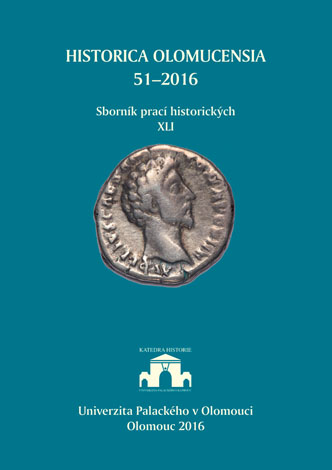Sčítání obcovací řeči na Moravě 1880–1910 a potenciál jejich společenské konfliktnosti
Census of a Usual Language in Moravia in 1880–1910 and Possibility of the Social Conflicts
Author(s): Pavel Kladiwa, Petr PopelkaSubject(s): History
Published by: Univerzita Palackého v Olomouci
Keywords: Moravia; Cisleithania; language statistics; census; national relations
Summary/Abstract: The study deals with Cisleithanian census in Moravia when national conflicts aroused in larger measure and later than in Bohemia. For census in 1880 and 1890, any special information about conflicts in Moravia were not found, only general complaints, which may be described such as a part of events in Bohemia, appeared. A section 13 (a usual language) played a fundamental role for conflicts in Moravia during the last Cisleithanian censuses in 1900 and 1910. The measure of a conflict was undeniably high in a case of national organisations, national activists and politicians, i. e. elites. A significant, however a hardly answered question, is a degree of a conflict in population. Every person had to record a usual language for census, only one, though he spoke another language very well and was practically bilingual, which may be supposed at a large number of inhabitants in Moravia. National political representatives, national organisations and also local national activists perceived census of a usual language such as a national statistics. They considered results to be an important tool for legitimation of their position in society and their requirements for the government so that they attempted to persuade as much people as possible about its necessity. Nationally-activistic reporting about falseness during census was certainly based on real information, on the other hand, it frequently exaggerated and stated unauthentic information. This is due to the fact that its main goal was to mobilize and activate the public. It mistakenly assumed that the whole population may be ethnically and linguistically clearly classified. As sources showed, during census of a usual language, people in some regions were under the pressure, especially from local authorities, employers and local masters. Local authorities’ bodies were the Achilles heel of the Cisleithanian censuses. In the vast majority of cases, the state entrusted them an execution and a control of census including the choice of censusbodies (officers and supervisors). However, local authorities in contrast to state bodies were often strongly nationalized, which led to problems in linguistically mixed areas. Despite the fact that state bodies emphasized that census bodies could not change records of people’s usual languages, it was happening. Thanks to insufficient control mechanisms (revisions of local census bodies took placeonly randomly), it might occur that a person was recorded with a different usual language than he wanted. Nevertheless, there existed many individuals who themselves reported a usual language that differed from their ethnicity. Reasons could be various: conformity with the majority, desire for being a part of a more culturally advanced locality, voluntary “assimilation” motivated by an effort “to bewithout troubles”.
Journal: Historica Olomucensia. Sborník prací historických
- Issue Year: XLI/2016
- Issue No: 51
- Page Range: 113-143
- Page Count: 31
- Language: Czech

